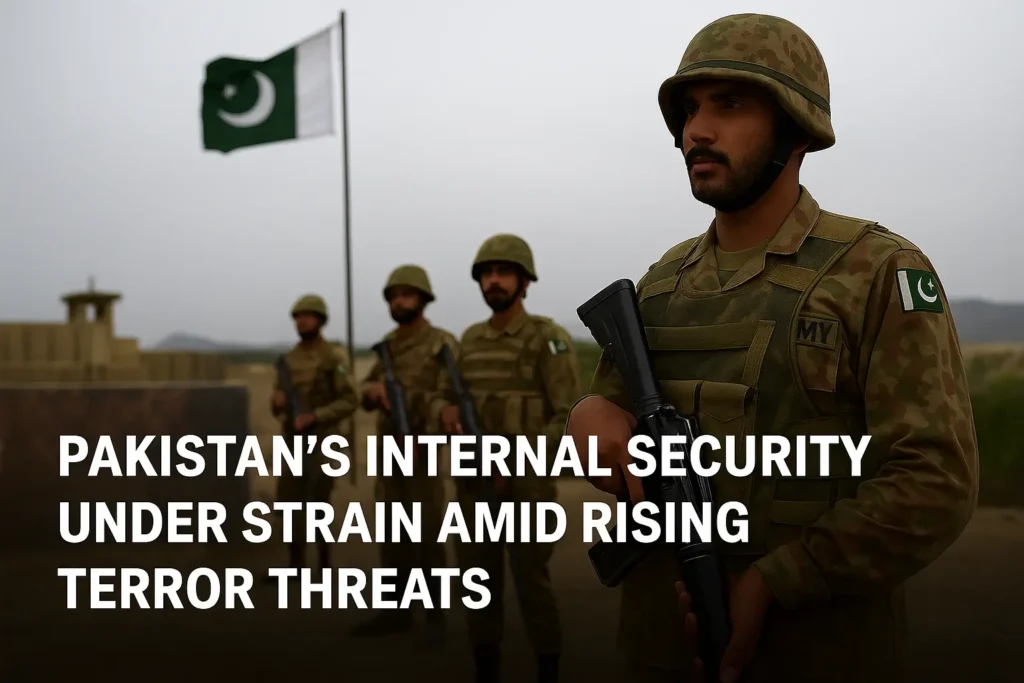Recent developments underscore Pakistan’s ongoing struggle with internal security, particularly the persistent threat of terrorism in Khyber Pakhtunkhwa and Balochistan. Militant attacks in these regions continue to test the country’s counterterrorism capabilities.
According to a statement by the military’s media wing, security forces have eliminated 12 terrorists in operations conducted over recent days across both provinces. However, these efforts have not come without sacrifice—several security personnel have been martyred during these missions. This includes four soldiers in North Waziristan who were reportedly killed while engaging with militants described as “Indian-sponsored” TTP fighters, and two Coast Guard personnel slain in an ambush near the Iranian border in Jiwani. These incidents highlight the urgent need to fortify vulnerable zones to prevent further loss of life.
There have also been media claims suggesting that a Taliban commander, identified as Saeedullah Saeed, advised militants to refrain from targeting Pakistani forces, labeling such acts as “fasad” (corruption) rather than legitimate jihad. However, the authenticity and impact of this warning remain questionable, as TTP attacks within Pakistan show no signs of abating. What Pakistan truly needs is a clear and enforceable commitment from the Afghan Taliban to prevent their soil from being used as a launchpad for cross-border terrorism.
This expectation was clearly articulated at a recent trilateral meeting in Beijing involving foreign ministers from China, Pakistan, and Afghanistan. Chinese Foreign Minister Wang Yi emphasized a joint agreement to oppose all forms of terrorism and to collectively counter militant threats affecting each nation. It may be prudent for both Islamabad and Beijing to reinforce this message with Kabul to ensure meaningful action.
In Balochistan, Pakistan’s generally positive relationship with Iran should pave the way for enhanced counterterrorism collaboration. At the same time, combating Baloch separatist militancy requires a dual approach—effective military operations paired with inclusive political dialogue to resolve the province’s underlying issues.
Countering terrorism in Pakistan demands a multipronged strategy that combines robust internal security measures, intelligence-led operations, and international cooperation. While regional adversaries may be backing extremist factions, Pakistan must remain alert and proactive in facing evolving threats.
Ultimately, defeating terrorism will require a balanced approach that integrates military responses with long-term social and political reforms to eliminate the root causes of militancy. Just as Pakistan has stood firm against foreign threats, it can overcome domestic terrorism with sustained resolve and strategic clarity.
Main Points
-
Pakistan faces persistent internal security threats, especially in Khyber Pakhtunkhwa and Balochistan.
-
12 terrorists were killed in recent operations by security forces.
-
Several Pakistani soldiers were martyred, including 4 in North Waziristan and 2 near the Iranian border in Jiwani.
-
The military attributes the TTP threat to “Indian-sponsored” elements.
-
A Taliban commander allegedly advised militants to avoid attacking Pakistan, calling it “fasad,” but this has not reduced TTP attacks.
-
Pakistan expects the Afghan Taliban to prevent their territory from being used for terrorism against Pakistan.
-
A recent trilateral meeting in Beijing (China, Pakistan, Afghanistan) emphasized joint efforts against terrorism.
-
China’s Foreign Minister highlighted regional cooperation to combat militant threats.
-
Pakistan-Iran ties could help improve coordination against cross-border attacks in Balochistan.
-
Tackling Baloch separatism requires both military action and political dialogue.
-
Counterterrorism strategy must be multi-pronged: military, intelligence, and diplomacy.
-
Regional rivals may be supporting extremist groups to destabilize Pakistan.
-
Pakistan needs to strengthen internal defenses and intelligence capabilities.
-
Long-term reforms—social, political, and economic—are vital to eliminate terrorism’s root causes.
-
A balanced, sustained approach is necessary for lasting peace and national security.
Vocabulary
-
Underscore
Meaning: To emphasize or highlight the importance of something. -
Persistent
Meaning: Continuing to exist or endure over a prolonged period; not easily stopped or eliminated. -
Martyred
Meaning: Killed because of one’s duty, beliefs, or cause—often used for soldiers or religious figures. -
Ambush
Meaning: A surprise attack by people lying in wait in a concealed position. -
Veracity
Meaning: Conformity to facts; accuracy or truthfulness. -
Fasad (Arabic origin, used in Islamic legal context)
Meaning: Corruption or mischief; wrongful disturbance of peace and order. -
Enforceable
Meaning: Capable of being imposed or executed legally or authoritatively. -
Collaboration
Meaning: The action of working jointly with others, especially for an intellectual or strategic purpose. -
Multipronged
Meaning: Involving several distinct elements or methods to tackle a complex issue. -
Militancy
Meaning: The use of confrontational or violent methods in support of a political or social cause.
